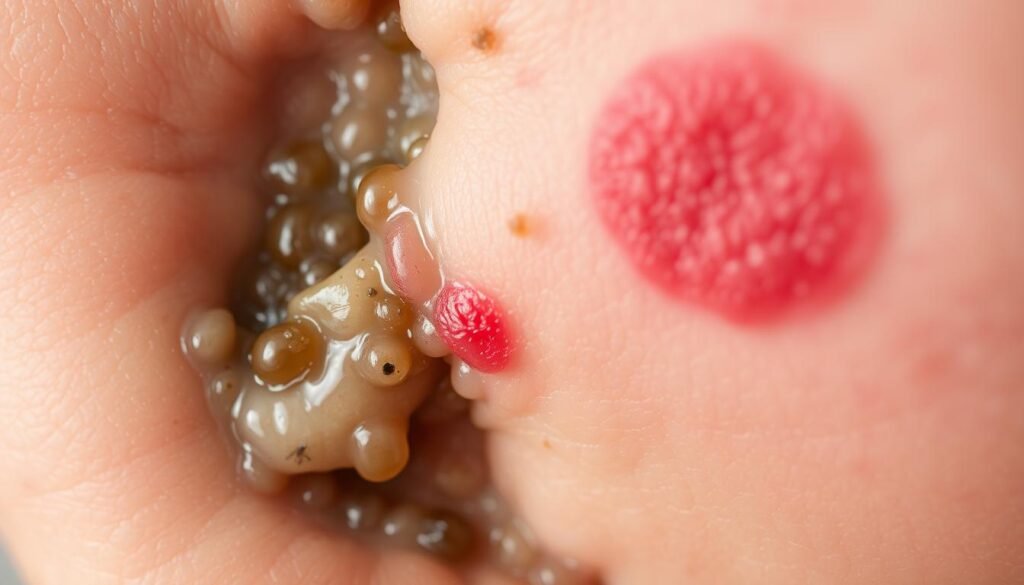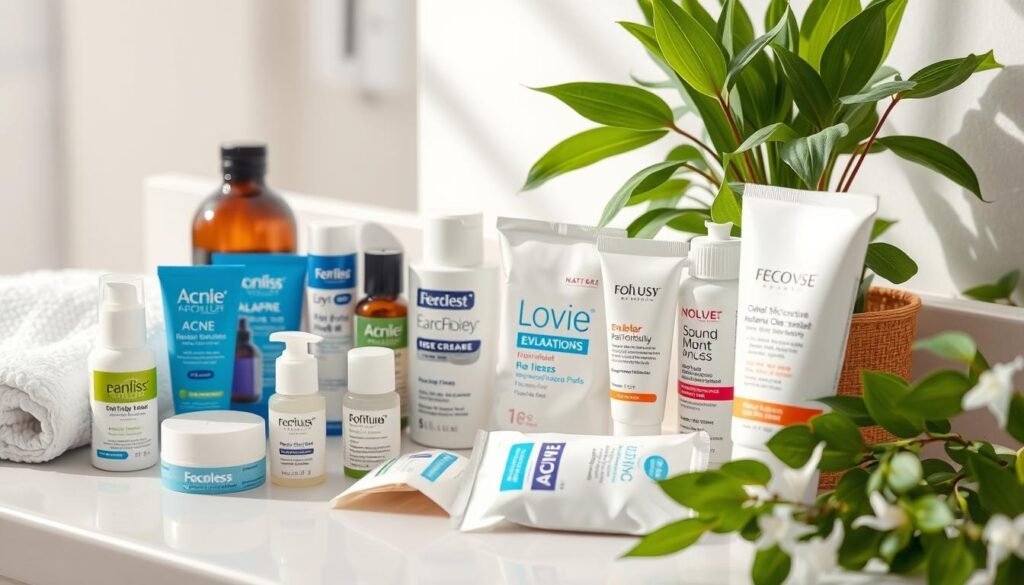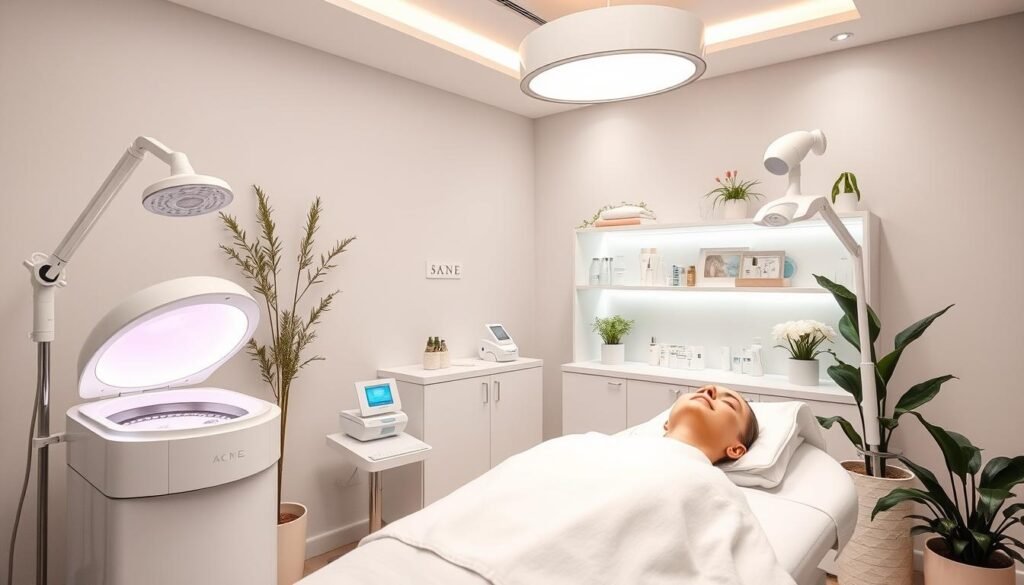Did you know that over 50 million people in the United States are affected by acne every year? This fact comes from the American Academy of Dermatology. It shows how common clogged pores and acne are. When tiny openings in our skin get blocked, we can get Acne Vulgaris. This leads to skin issues like blackheads, whiteheads, and cysts.
Starting the path to clear skin means knowing what causes clogged pores. Things like too much sebum, using pore-clogging products, and less elastic skin matter a lot. Also, many deal with acne from their teens into adulthood. This makes finding good treatments and prevention methods very important.
This article will cover everything about clogged pores and acne. We’ll look at the main symptoms, causes, best treatments, and skincare tips. Whether you want to stop breakouts or solve current skin problems, learning to take care of your skin is key. It’s the first step to getting a healthier, clearer face.
Key Takeaways
- Acne affects around 50 million Americans annually, highlighting its prevalence.
- Understanding clogged pores is essential for effective treatment of Acne Vulgaris.
- Prevention strategies include using noncomedogenic products and maintaining a consistent skincare routine.
- Exfoliation plays a vital role in unclogging pores and improving overall skin health.
- Professional treatments may be necessary when at-home remedies fail to deliver results.
Understanding Clogged Pores and Acne
Clogged pores happen when dead skin cells and extra oil block skin pores. This can cause different types of acne, such as blackheads and cysts. Understanding this connection helps in managing and treating these skin issues well.
Pores are crucial for healthy skin as they let oil and sweat come out. If they get blocked, it leads to acne. Non-inflammatory acne includes blackheads and whiteheads. Inflammatory acne has more severe forms like cysts. Each type of acne has its own treatment methods, showing how important it is to know the difference between them.
Mild acne usually has a few whiteheads, blackheads, and small pimples. Moderate acne has more of these and starts to show inflammation. Severe acne means lots of pimples, redness, and swollen areas. Knowing about different acne levels is key for those looking for solutions. Experts in dermatology offer valuable advice.
Lifestyle and certain products can make acne worse. For example, some hair products can cause pimples near the hairline. Taking care of your skin by choosing the right products and habits is important. This approach helps keep the skin clear and deals with clogged pores effectively.
Common Causes of Clogged Pores
Many factors cause clogged pores, including too much sebum and dead skin build-up. Oily skin types are often more prone to this issue. It’s essential for these individuals to use effective strategies to prevent clogged pores.
Things like air pollution and certain habits also contribute to clogged pores. Makeup and heavy sunscreens can trap dirt on the skin. This leads to blackheads and whiteheads. In men, shaving and oilier skin can make pores larger and clogged. Wearing hats or glasses that catch dirt, high humidity, and touching the face often can make things worse.
Genetics and changes in hormones, like during puberty or pregnancy, can make clogged pores more likely. Stress, not getting enough sleep, and skin congestion are linked. Managing stress with meditation or yoga might help keep your skin clear. This advice comes from the American Academy of Dermatology.
It’s a good idea to use skincare products that don’t clog pores. Ingredients like salicylic acid and benzoyl peroxide are good for keeping pores clear. Gentle exfoliation, either chemical or manual, also helps. Remember to cleanse regularly, remove makeup, and keep pillowcases clean. This reduces oil and prevents pores from clogging. For more tips on dealing with clogged pores, click here.
| Cause | Description |
|---|---|
| Sebum Overproduction | Excess oil from skin glands leading to clogged pores. |
| Environmental Pollutants | Dirt and toxins that accumulate on the skin’s surface. |
| Makeup and Skincare Products | Heavy products that are comedogenic can block pores. |
| Lifestyle Choices | Habits like not sleeping enough and high-stress levels impacting skin health. |
| Genetics and Hormonal Changes | Family history and fluctuations during puberty or pregnancy increase susceptibility. |
Key Symptoms of Clogged Pores
It’s crucial to spot the Symptoms of Clogged Pores early. The chin, nose, cheeks, and forehead are common trouble spots. Look out for signs like:
- Whiteheads
- Blackheads
- Cystic acne
- Redness
- Rough, bumpy skin
- An overall dull appearance
Hormonal changes can lead to acne, especially near the jaw and lower cheeks. This might include skin congestion with noticeable pores and pimples. Too much oil makes things worse, causing pores to get bigger and trap more dirt and oil.
As we age, our skin loses its tightness, making pores look bigger. This lets in more dirt and impurities. Some soaps and skincare items, like isopropyl myristate and parabens, can irritate and make things worse.
To keep skin clear, recognizing these signs is key. Ignoring them can lead to bigger problems like more acne, scars, or dark spots. Good skin care, such as cleaning and scrubbing regularly, helps stop these issues from getting worse.
How Clogged Pores Lead to Acne
Clogged pores are a big reason for skin problems, including inflammatory acne. They happen when too much oil, dead skin, and bacteria fill the pores. This makes a perfect place for acne to start. The buildup makes the skin thick and helps bacteria grow. This leads to redness, swelling, and skin blemishes.
About 85% of people will face some acne during their teen years. Hormone changes make this worse by making more oil. This oil mixes with dead skin, blocking pores even more. By knowing what causes it, people can fight back against acne.

Genes, getting older, and the environment all affect our pores. For example, men often have oilier skin because they have more active oil glands. Not cleaning your face well enough also leaves oil and dirt behind.
Cleaning your face right, with oil and water cleansers, can get rid of makeup and dirt. Without good care, clogged pores get worse, and you might need stronger treatments for inflammatory acne.
| Factor | Impact on Pores |
|---|---|
| Overactive Sebaceous Glands | Produces excess oil, leading to congested pores |
| Dead Skin Cell Accumulation | Prevents oil from escaping, causing blockages |
| Genetics | Influences pore size and oil production |
| Aging | Reduces skin elasticity, potentially leading to enlarged pores |
| Sun Damage | Destroys skin structure, enhancing pore visibility |
To deal with skin blemishes and acne, keep your skin care regular. Use the right products. Gentle exfoliation helps, and avoid harsh treatments. This can make your skin better over time.
Effective Prevention Strategies for Clogged Pores
To keep your pores clear, it’s important to stay on top of your skin care. Using non-comedogenic products helps a lot. They are made to not clog your pores, which is great for people with acne.
Make sure your skincare routine includes gentle exfoliation and water-based moisturizers. Exfoliating helps remove dead skin that can clog pores. Also, products with Salicylic Acid are good for controlling oil and keeping skin clear.
Not just products, but lifestyle habits are key too. Try not to touch your face too much to avoid adding dirt and oil to your skin. Things like pollution, humidity, and stress also play a role, so protect your skin from these as much as possible.
See this table for a quick look at how to avoid clogged pores:
| Prevention Strategy | Description |
|---|---|
| Use Non-Comedogenic Products | Opt for skincare and makeup items that do not clog pores. |
| Daily Skincare Routine | Maintain a regular routine that includes cleansing, exfoliating, and moisturizing. |
| Gentle Exfoliation | Exfoliate several times a week to remove dead skin cells. |
| Avoid Touching the Face | Minimize contact with the face to prevent dirt and oils from blocking pores. |
| Hydration | Use water-based moisturizers to maintain skin hydration without clogging pores. |
Treatment Options for Clogged Pores and Acne
Treating clogged pores and acne means finding the right approach for you. Up to 50 million people in the U.S. are affected by acne. That’s why finding effective treatment is so important. Over-the-counter treatments are a good starting point. If they don’t work, a dermatologist might suggest prescription medicines.
Over-the-Counter Products
Over-the-counter acne treatments often contain salicylic acid and benzoyl peroxide. These help clear pores, lessen swelling, and stop more pimples. Salicylic acid peels away dead skin to keep pores open. Benzoyl peroxide fights the bacteria that cause acne. Many people begin with these treatments because they’re easy to get and often work well.
Prescription Medications
If over-the-counter products don’t cut it, you might need prescription treatments. Dermatologists sometimes prescribe creams like retinoids, which help the skin and clear pores. Pills for hormone issues, like spironolactone, are also an option, especially for women. For severe cases, doctors may even consider antibiotics to avoid scars and control stubborn acne.

At-Home Remedies to Unclog Pores
Using natural methods can gently open pores and help with acne. Many choose DIY solutions for a cheap way to look after their skin. Some popular ingredients are known to clean pores well without harming the skin.
Natural Ingredients to Consider
Several natural options can help open pores and tackle acne problems. Here are some recommended choices:
- Activated Charcoal: It pulls out dirt and too much oil from your skin.
- Clay Masks: They soak up oil and dirt, which is why many love them.
- Tea Tree Oil: Great for calming the skin because it fights inflammation.
- Honey: Its germ-fighting feature is good for lessening acne.
- Hemp Seed Oil: Helps control oil and gives skin important fatty acids.
Adding these natural options to your skincare can unclog pores and improve skin feel. Still, it’s key to try these treatments carefully to avoid any skin issues.
Methods to Avoid
Some DIY skin treatments might not be safe or could make things worse. It’s best to steer clear of these methods:
- Harsh Scrubs: They can irritate and harm your skin’s protection.
- Baking Soda: Its high pH may mess with your skin’s balance.
- Lemon Juice: It might make your skin sensitive to light and irritate it.
- Pore Strips: They might irritate if your skin is sensitive.
Learning about the risks of DIY skincare is important. Mixing these tips with a doctor’s advice can help you treat your skin safely and effectively.
Professional Treatments for Acne
Dealing with acne? Professional treatments can make a big difference. Dermatology clinics have many services like extractions and peels. They customize them for you. These can really help manage tough acne and make your skin look better.
What to Expect from Extractions
A trained dermatologist can do extractions the right way. They get rid of blackheads and other blemishes without causing scars. You’ll start with a deep clean. Then, they gently clear out pores. This approach is careful to avoid harming your skin. It also helps stop more pimples from forming.
Benefits of Chemical Peels
Chemical peels really help with acne. They use strong glycolic acid to clean up the skin. These peels take off dead skin, helping new skin show. This can mean:
- Fewer blackheads and whiteheads
- Nicer skin texture
- Less visible scars
There are also laser and light therapies. These are good for fixing skin color changes and scars. You might need a few treatments to see the best results. Chemical peels can really change the game for bad acne. They tackle the main causes and smooth out your skin.

Maintaining Clear Skin Post-Treatment
After clearing up acne, it’s key to focus on keeping skin clear. A solid skincare routine is vital after acne. It helps prevent new breakouts and boosts skin health.
Wash your face morning and night for clear skin. Use gentle cleansers like CeraVe’s Acne Foaming Cream Cleanser. It has 4% benzoyl peroxide to remove dirt and oil without harming your skin’s barrier.
Moisturizing is key in post-acne care. Choose moisturizers that won’t clog pores. Ingredients like niacinamide, hyaluronic acid, and ceramides strengthen the skin. Try CeraVe’s PM Facial Moisturizing Lotion for these benefits.
Using sunscreen daily is crucial to protect skin from UV rays. Pick a broad-spectrum sunscreen such as CeraVe’s with SPF 30. Reapply every two hours to guard against sun damage, especially important if using exfoliating treatments.
Staying consistent with topical retinoids is important. For example, adapalene users saw acne return when they stopped. Daily use initially, followed by less frequent application, maintains skin health. This approach after 6 to 12 weeks keeps skin in good shape.
Checking in with a dermatologist is essential. A visit every three months can show how well your skincare routine works. It helps tweak your approach as needed.
These habits help keep skin clear and reduce future breakouts. They foster a healthy foundation through cleaning, moisturizing, protecting from the sun, and using retinoids.
For more info on acne causes, click here to learn about environmental triggers.
Conclusion
Understanding clogged pores and acne means knowing about genetics, hormonal changes, and lifestyle. More than 85% of teens and many adults struggle with skin issues. Hence, it’s key to practice healthy skin care habits. This includes keeping your skin clean, using the right treatments, and getting advice from professionals.
The role of making informed choices in Summary of Clogged Pores Treatment is key. Acne affects both your skin and your feelings. Working with dermatologists for customized treatments can truly make a difference. This can lead to not just better skin, but also a happier life.
Stick to a strict cleaning schedule and exfoliate regularly for your skin care. Including treatments like benzoyl peroxide and salicylic acid helps. Combining good skincare with a healthy diet and lifestyle is crucial for clear, healthy skin.